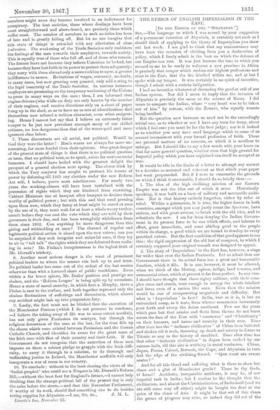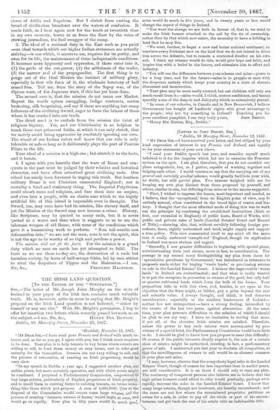EDITOR OF TIIE SPECTATOR."]
suffer most. The number of members in such societies has been SIR,—The language to which I was moved by your suggestion of late and is greatly falling off. But let no one imagine that of a permanent retention of Abyssinia, is certainly not such as I this state of things is attended with any alleviation of class should think of applying to the theory of Imperialism you drew jealousies. The weakening of the Trade Societies only embitters out last week. I am glad to think that my remonstrance may the feelings of the men towards their employers, towards society. have been the occasion of eliciting from you a declaration of This is equally true of those who fall off, and of those who remain. policy, which I freely admit is the best on whiCh the defence of The former leave not because they believe Unionism to be bad, but our Empire can rest. It was just because the tone in which you because they have lost faith in its power to protect them adequately; seemed to me to he ready to welcome a new province in Africa they carry with them abroad only a more reckless temper, a greater is precisely that temper which undoes our highest professions and indifference to means. Reductions of wages, necessary, no doubt, aims in the East, that the fire kindled within me, and at Nat I in many cases, but now growing very general, only add a sting to spake with my tongue. It was certainly in no spirit of invective, the legal insecurity of the Trade Societies. In various instances though I admit with a certain indignation.
employers are presuming on the temporary weakening of the Unions I had no iuteution whatever of discussing the good or evil of our to press iu many ways on the men ; thus, I am informed that Indian system. Nor did I mean to imply that the invasion of engine-drivers (who while on duty are only known by the number Abyssinia is precisely the same as the seizure of Rome. I did of their engines, and receive directions only on a sheet of paper mean to compare the Indian, whose " very heart was to be. taken hung up in the shed, so as to have no means of identification) find out of him" by retreat, with the Zouave, who equally resents themselves now refused a written character, even when emigrat- being baulked.
ing. Hence I cannot but say that I believe an extremely bitter But the question now between us need not be the exceedingly temper to be just now prevalent amongst many of our skilled trivial one, as to whether or not I have any turn for irony, about artizans, no less dangerous than that of the worse-paid and more which I feel sure you must be far the best judge ; nor is it indeed ignorant class below. as to whether you may have used language which to some of us
Lincoln's Inn, November 25. the germs of progress may arise, as indeed they did out of the
chaos of Attila and Napoleon. But I shrink from casting the bread of civiliz ttion broadcast over the waters of confusion. It needs faith, as I hear again now for the tenth or twentieth time in my own memory, borne to us from the East by the voice of crowing journalism, the foul swagger of the camp.
3. The ideal of a national duty in the East such as you paint —an ideal towards which our higher Indian statesmen are actually striving—is one which, it occurs to me, requires for its purity, and even for its life, the maintenance of three indispensable conditions. It becomes mere hypocrisy and oppression, if there enter into it, (1) the pride of the conqueror, (2) the selfishness of the trader, (3) the narrow zeal of the propagandist. The first thing is to purge out of the ideal Mission the instinct of military glory, especially in that vile form of it, the wholesale butchery of half armed foes. Tell me, from the story of the Sepoy war, of the Opium wars, of the Japanese wars, if this has yet been done.
The second care is, that the mission do not mean our Market. Repeat the words opium smuggling, indigo contracts, cotton brokering, silk bargaining, and say if these are anything but camp followers of the civilizing Sword, eager to farm the labour of those whom it has crushed into our trade.
The third need is to exclude from the mission the taint of religious bigotry. Yes, and our Christianity is so helpless to touch those vast primaeval faiths, at which it can only shriek, that we merely avoid being oppressive by resolutely ignoring our own. The wisest of our Indian rulers well know that our rule is only tolerable or safe so long as it deliberately plays the part of Pontius Pilate to the life.
Your ideal of a mission is a high one ; but stretch it to the facts, and it bursts.
4. I agree with you heartily that the wars of Rome and con- quests in the past must be judged by their relative and historical character, and have often subserved great civilizing ends. Our school has surely been foremost in urging this truth. But heathen military Rome is not Christian commercial England ; nor is morality a fixed and stationary thing. The Imperial Polytheism could absorb races and religions, and fuse them into an empire, and even into a people, with an elastic ease which to the highly artificial life of this island is impossible even in thought. The Sword, too, may once have had its mission, like slavery itself, and yet the Mission of the Sword may now become a crime. History, like Scripture, may be quoted to many ends, but it is never quoted to a worse end than when it suggests to us to use the inhuman weapon of old Rome, with none of the conditions which gave it a humanizing work to perform. " Non tali auxilio non defeusoribus iatis :" we are not the men, ours is not the spirit, this is not the age to be worthy of so high and perilous a power.
The mission will not fit the facts. For the mission is a grand duty which no race on earth has yet attempted to fulfil. The facts as we see them to-day are, the destruction of a rude but harmless society, by hosts of half-savage Sikhs, led by men athirst to rival the despoilers of Tippoo and the Mahrattas. —I am,



































 Previous page
Previous page